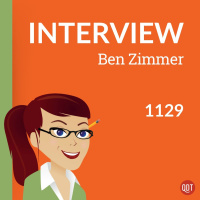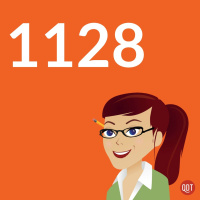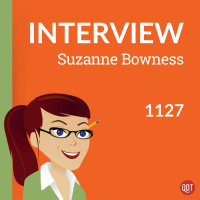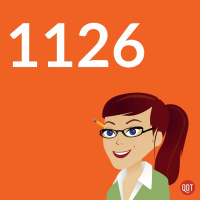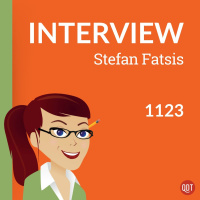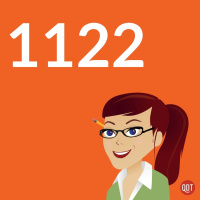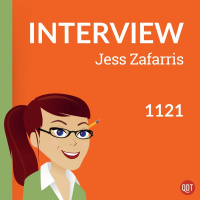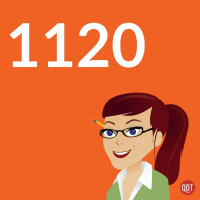Sinopsis
You'll get fun and friendly doses of writing advice in three short chunks: a Quick and Dirty Tip, a meaty middle, and a final tidbit. Grammar Girl covers everything from punctuation and grammar to style and voice. QuickandDirtyTips.com
Episodios
-
An inspiring tutor, 'New York System' hot dogs, and 'queen spotting.'
04/12/2025 Duración: 25min1139. In this bonus discussion with Martha Barnette back in March, we look at Martha's pivotal twelve-year journey with a polyglot tutor who transformed her understanding of ancient Greek, starting with the etymology of "Oedipus." We also look at her beekeeping adventures, including the unknown-to-me history of the term 'queen bee' and a unique book on spotting them.Martha Barnette's websiteMartha's book, “Friends with Words: Adventures in Languageland”Martha's podcast, "A Way with Words"
-
Why Brits eat biscuits and Americans eat cookies. Why brands keep nouning everything. Hamster alert.
02/12/2025 Duración: 17minThis week, in honor of National Cookie Day, we look at the vocabulary split between British and American English, including the differences between a cookie and a biscuit, and the two meanings of "pudding." Then, we look at anthimeria, the advertising trend of turning one part of speech into another, as in the slogan "Together makes progress."The anthimeria segment was by Ben Yagoda,whose books include "Gobsmacked! The British Invasion of American English" and the novel "Alias O. Henry." His podcast is "The Lives They’re Living."
-
Rob Drummond on languaging and our fluid speaking identities
27/11/2025 Duración: 18minIn this bonus conversation with Rob Drummond from back in June, he and I get into the fascinating concept of "languaging" — the idea that speaking is an active process we use to constantly shape and project our identities. Rob explains how our "speaking identities" are incredibly fluid, changing based on context, audience, and even the language we're using. Rob Drummond - https://bsky.app/profile/robdrummond.bsky.socialRob's book, "You're All Talk"
-
The sinful fork (and other dinner-table surprises)
25/11/2025 Duración: 14min1136. This week, we go full Thanksgiving, talking about the origin of butter knives, forks, and more. You'll love all the tidbits you can share with your family or friends during dinner.
-
Why print dictionaries still matter, with Peter Sokolowski
20/11/2025 Duración: 35min1135. This week, we talk with Peter Sokolowski, editor at large at Merriam-Webster, about the new print 12th Collegiate Dictionary. We look at why print still matters, how the dictionary used lookup data to decide which words to drop (least looked-up compounds), and the importance of serendipity when researching words in a physical book.Find Peter on BlueSky.
-
Personification in language and AI. Dictums, maxims, and proverbs. Expensitive.
18/11/2025 Duración: 17min1134. This week, we look at the poetic power of personification (the language quirk that gives human traits to nonhuman things) and why style guides advise against using it for AI. Then, we look at the different names for common sayings, defining a proverb and breaking down the four main types: maxim, adage, dictum, and truism.The personification segment was written by Karen Lunde, a longtime writer and editor turned web designer and marketing mentor. Solo service business owners come to her for websites where beautiful design meets authentic words that actually build connections. Find her at chanterellemarketingstudio.com.The proverbs segment was written by Jim Norrena, MFA, who has been writing, editing, and leading grammar and proofreading workshops for more than thirty-five years. He founded TypoSuction.com, an independent editorial service, and is a member of Bay Area Editors’ Forum. He also serves on the board of Professional Publishers Network. You can find him at LinkedIn.
-
The secret rules of crossword puzzles, with Natan Last
13/11/2025 Duración: 29min1133. This week, crossword pro Natan Last talks about his book "Across the Universe." We look at the technical and cultural differences between American and British puzzle styles and the secrets that will surprise you about how clues are written and edited. We also look at "crosswordese," the long submission process for the “New York Times,” and the AI that won a human crossword tournament.Find Natan Last at Natanlast.com.Get the book, "Across the Universe."
-
How '23 skidoo' & 'at sixes and sevens' are related to '6-7.'
11/11/2025 Duración: 18min1132. This week, in honor of Dictionary.com choosing "6-7" as its Word of the Year, we look at the origin of other number phrases: "23 skidoo" and "at sixes and sevens."
-
What a ‘Science' magazine experiment says about the future of AI in journalism, with Abigail Eisenstadt.
06/11/2025 Duración: 23min1131. This week, we talk with ‘Science' magazine senior writer Abigail Eisenstadt about her team's year-long experiment testing ChatGPT's ability to summarize research papers. We look at their methodology, the limitations they realized, and their main finding: that AI could “transcribe” scientific studies but failed to “translate” them with context. Read the report: https://www.science.org/do/10.5555/page.2385668/full/chatgpt_project_report_final.pdf
-
What Roman togas have to do with today's elections. 'Home in' versus 'hone in.'
04/11/2025 Duración: 16min1130. This week, we look at words related to elections, and then I help you remember the difference between "home in" and "hone in" with a tip that includes a shocking historical tidbit about spiders.
-
Finding the true history of words, with Ben Zimmer
30/10/2025 Duración: 26min1129. This week, we talk with Ben Zimmer about the linguistic detective work of antedating words — finding earlier usages than those published in dictionaries. We look at the surprising origins of "Ms.," "scallywag," and the baseball history of "jazz."Find Ben on his website: Benzimmer.comVietnam Graffiti Project at Texas Tech's Vietnam Center: https://www.vietnam.ttu.edu/graffiti/The interface for searching the text on the canvas bunk bottoms: https://vva.vietnam.ttu.edu/#graffitiSearchBen's post that includes the Daily Orange article where Helen Herman’s claims she coined "supercalifragilisticexpialidocious." March 10, 1931: https://www.visualthesaurus.com/cm/wordroutes/tracking-down-the-roots-of-a-super-word/
-
‘Ghost words’ and their history. Rules for ‘between’ and ‘among.’ Wilsoning.
28/10/2025 Duración: 14min1128. This week, in honor of Halloween, we look at “ghost words” and phrases, from “ghost runners” in baseball to “ghost forests” made by earthquakes. We also look at the difference between “between” and “among” for collective groups.Episodes mentioned in this episode: 734 - Ghost Words1056 - How to be a ghostwriter, with Dan Gerstein
-
How to be a ‘feisty freelancer,’ with Suzanne Bowness
23/10/2025 Duración: 28min1127. This week, we talk with Suzanne Bowness about creating a successful life as a writer. We look at high-value industries that are good targets for freelance work and the best job titles to pitch. Suzanne provides practical advice on tracking projects and follow-ups and explains why established freelancers should use their downtime to experiment and learn new tools.Find Suzanne on her website, Codeword Communications.Get the book, "Feisty Freelancer."
-
Shakespeare's ‘wherefore’ and other false friends. The language of fear. A Tom.
21/10/2025 Duración: 17min1126. This week, we look at words for fear and why "wherefore" doesn't mean what many people think it means.The false friends segment was written by Karen Lunde, a career writer and editor. These days, she designs websites for solo business owners who care about both words and visuals. Find her at chanterellemarketingstudio.com.
-
Why Q needs U and how hieroglyphics created our alphabet, with Danny Bate
16/10/2025 Duración: 37min1125. This week, we talk with linguist and author Danny Bate about his book, "Why Q Needs U." We look at the ancient origins of our alphabet, tracing its conceptual leap from Egyptian hieroglyphs to symbols that represent sounds. Danny explains the "acrophonic principle" (one sound from a picture) and why the letter A was originally a consonant, not a vowel. Find Danny Bate on his website, Bluesky or on X. Get the book, "Why Q Needs U."Listen to Danny's podcast, "A Language I Love Is..."
-
The political, royal and obscene meanings of blue. The differences in ‘plumb’ and plum.’
14/10/2025 Duración: 15min1124. This week, we look at blue idioms, including the political history of "blue states," the medical reason for being "blue in the face," and the astronomical reason for a "blue moon." Then, we look at the difference between 'plumb' (with a B), and 'plum' (without a B).
-
The fight for the modern dictionary, with Stefan Fatsis
09/10/2025 Duración: 32min1123. This week, we talk with author and self-described “word freak” Stefan Fatsis about his book "Unabridged." He shares his experience embedding at Merriam-Webster to become a lexicographer, sharing the contrast between the company's 1940s headquarters and the modern digital business. We look at the tension between updating old words (like the surprising original meaning of "pompom girl") and the need to add new, "sexy" words to generate web traffic.Find Stefan Fatsis on his website, Bluesky or Facebook. Get the book, Unabridged.
-
‘Math’ versus ‘maths’ and other British differences. ‘Spendthrift’ means what?
07/10/2025 Duración: 13min1122. This week, we look at two subtle but persistent differences between American and British English: why Americans say "math" and Brits say "maths," and why Americans are "in the hospital" while Brits are "in hospital." Then, we look at the historical meaning of the word "spendthrift" and introduce some wonderfully obsolete insults like "dingthrift" and "scrapethrift."The "maths" segment was written by Samantha Enslen, who runs Dragonfly Editorial. You can find her at dragonflyeditorial.com.The "spendthrift" segment was written by Karen Lunde, a career writer and editor. These days, she designs websites for solo business owners who care about both words and visuals. Find her at chanterellemarketingstudio.com.
-
Why ‘Useless Etymology’ gives you super powers, with Jess Zafarris
02/10/2025 Duración: 33min1121. This week, we talk with Jess Zafarris about her book “Useless Etymology.” We look at three ways she says etymology gives you superpowers. We also look at the origins of simple words and learn why “girl” didn't always mean a female child, the unexpected historical figures behind “fedora” and “sideburns,” and why the word “outrage” has nothing to do with “rage.”Find Jess Zafarris online: Useless Etymology, TikTok, Twitter, Instagram
-
Can you use ‘epicenter’ for positive things? The etymology of ‘bro.’ Mukwonago, Oconomowoc.
30/09/2025 Duración: 16min1120. This week, we look at tricky uses of the word "epicenter" and how people feel about using it metaphorically. We also look at where the word “brother” came from and how it branched into “bro,” “boy,” and even “buddy.”The "brother" segment was written by Valerie Fridland, a professor of linguistics at the University of Nevada in Reno and the author of "Like Literally, Dude: Arguing for the Good in Bad English." You can find her at valeriefridland.com.











